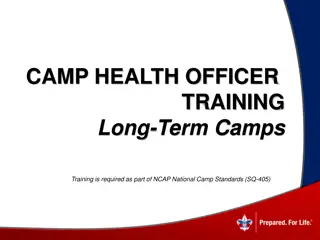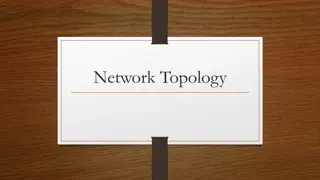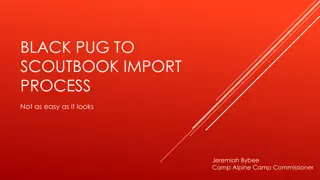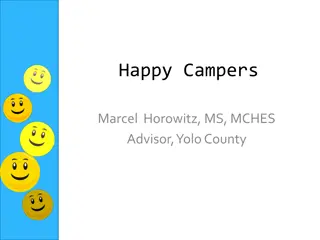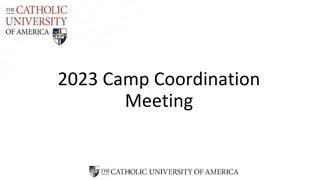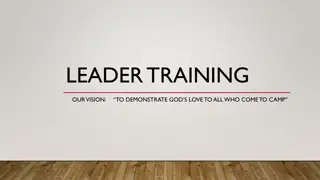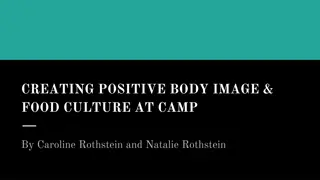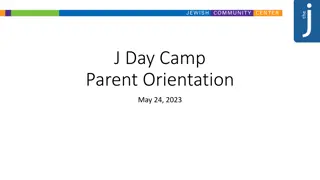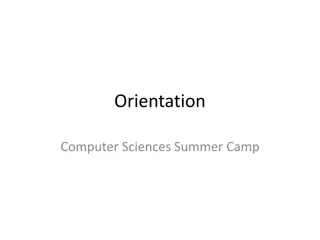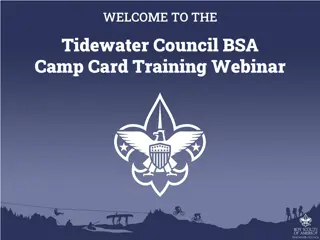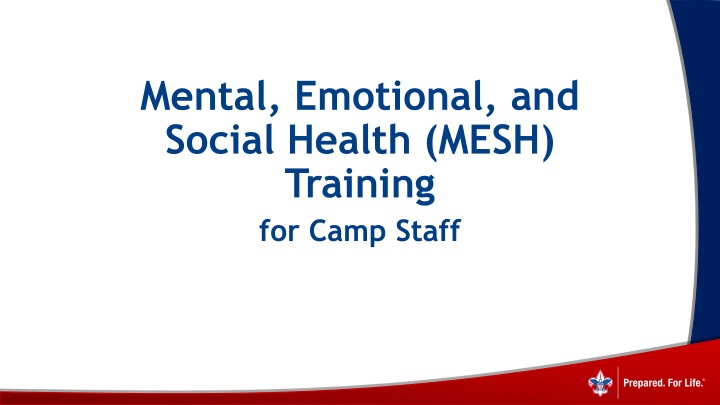
Camp Staff Training: Mental, Emotional, and Social Health Awareness
Enhance camp staff's awareness of mental, emotional, and social health through the MESH training program. Understand mental health challenges, self-care strategies, and how outdoor activities impact well-being.
Download Presentation

Please find below an Image/Link to download the presentation.
The content on the website is provided AS IS for your information and personal use only. It may not be sold, licensed, or shared on other websites without obtaining consent from the author. If you encounter any issues during the download, it is possible that the publisher has removed the file from their server.
You are allowed to download the files provided on this website for personal or commercial use, subject to the condition that they are used lawfully. All files are the property of their respective owners.
The content on the website is provided AS IS for your information and personal use only. It may not be sold, licensed, or shared on other websites without obtaining consent from the author.
E N D
Presentation Transcript
Mental, Emotional, and Social Health (MESH) Training for Camp Staff
How the Outdoors Impacts Health Physical, Mental, Emotional, and Social Benefits
Why This Training? There are mental health challenges at camp!
What is a Mental Health Challenge? A mental health challenge is when: There is a major change in a person s thinking, feeling, or acting. The change interferes with the person s ability to live their life. The interference does not go away quickly and lasts longer than typical emotions or reactions would be expected to.
What Does MESH at Camp Look Like? Mental, Emotional, and Social Health (MESH) Mental Health how we think, feel and act, especially when we are experiencing stressors in camp Emotional Health ability to manage and express feelings to Scouts, adult leaders, and camp staff Social Health ability to interact and form meaningful relationships with Scouts, adult leaders, and fellow staff
Self-care: Helping Others Also Means Helping Yourself Do something just for you Take time off Make friends Have fun! Have a good diet Stay hydrated Sleep Rest
Understand the Behaviors To Watch For: U-S-A
Observing Scout Behaviors and Noticing Changes You see many of the same Scouts several hours every day, so you are well-positioned to notice changes in these Scouts. Recognize that not all challenges in camp are mental health challenges. Learn to recognize the differences between typical Scout behavior and behaviors that may be related to MESH concerns, and proactively address them if needed.
Behaviors to Watch for From Scouts and Staff Body language
What is body language? Body language is how we communicate nonverbally through gestures and movements Facial Expressions Hand Gestures Full Body Gestures Smile = I m happy. Frown = I m not happy. Eyes closed tight = I don't want to see that. Eyes open wide = I'm so surprised. Eyes rolling = I'm annoyed. Wrinkled/furrowed brow = I'm confused/mad. Thumbs up = Yes, I agree. High-five = Good job! Crossed fingers = Hope for the best. Fist bump = SUP Crossed arms = I'm not pleased. Facepalm = I messed up. Shoulder shrug = I don t know. Foot tapping = Hurry up.
Why is it important to be mindful of our body language? Be mindful of your body language. What message are you giving to others around you? Think about when you are happy. How does your body look? How do you want those around you to look? If you were happy and your best friend looked angry, you probably would be upset at them. Now think about when you re sad. Do you want those around you to show happy body language? Or sad body language?
What should our body language look like when comforting others in distress? Facial Expressions Slight smile Maintain eye contact Relaxed eyes Subtle head nods Hand Gestures Hands should be at your side or on your lap Sometimes we want to place our hand on others for comfort (be sure to have consent before touching someone) Body Gestures Arms uncrossed and at your side If the Scout is seated, you should sit. If they are standing, you should stand. Subtle, soft head nods to communicate you are listening Be mindful of personal space but allow for close proximity.
Body Language Exercise You are getting ready to head to dinner when you come across a Scout sitting by a tree alone. How should you approach them? a) Walk over and sit down near them. b) Run over to the Scout and stand there. c) Don t approach. Continue walking; you re hungry.
Body Language Exercise You are getting ready to head to dinner when you come across a Scout sitting by a tree alone. How should you approach them? a) Walk over and sit down near them. b) Run over to the Scout and stand there. c) Don t approach. Continue walking; you re hungry.
Observing Scout Behaviors and Noticing Changes Typical Scout Behavior MESH-Concerning Behavior Sadness or anxiety, such as when missing trading post hours or being in a flag ceremony. Bountiful energy and excitement for many activities in camp program Taking few or no showers, not changing socks/underwear, withholding bowel movements Depressive feelings lasting more than a few days, or frequent panic attacks Hyperactivity, inactivity, or alternating between, without apparent cause Not washing hands or brushing teeth, wearing wet clothes, avoiding bathrooms Eating sparingly, skipping meals, binging, not drinking enough water, very frequent visits to the bathroom Picky eating, not eating during meals, or only from camp store/snack shop
Observing Scout Behaviors and Noticing Changes Typical Scout Behavior MESH-Concerning Behavior Sadness or anxiety, such as when missing trading post hours or being in a flag ceremony. Bountiful energy and excitement for many activities in camp program Taking few or no showers, not changing socks/underwear, withholding bowel movements Depressive feelings lasting more than a few days, or frequent panic attacks Hyperactivity, inactivity, or alternating between, without apparent cause Not washing hands or brushing teeth, wearing wet clothes, avoiding bathrooms Eating sparingly, skipping meals, binging, not drinking enough water, very frequent visits to the bathroom Picky eating, not eating during meals, or only from camp store/snack shop
Observing Scout Behaviors and Noticing Changes Typical Scout Behavior MESH-Concerning Behavior Sadness or anxiety, such as when missing trading post hours or being in a flag ceremony. Bountiful energy and excitement for many activities in camp program Taking few or no showers, not changing socks/underwear, withholding bowel movements Sad feelings lasting more than a few days, or continued and irrational worrying attacks. Hyperactivity, inactivity, or alternating between, without apparent cause Not washing hands or brushing teeth, wearing wet clothes, avoiding bathrooms Eating sparingly, skipping meals, binging, not drinking enough water, very frequent visits to the bathroom Picky eating, not eating during meals, or only from camp store/snack shop
Observing Scout Behaviors and Noticing Changes Typical Scout Behavior MESH-Concerning Behavior Sadness or anxiety, such as when missing trading post hours or being in a flag ceremony. Lots of energy and excitement for many activities in the camp program. Taking few or no showers, not changing socks/underwear, withholding bowel movements Sad feelings lasting more than a few days, or continued and irrational worrying attacks. Hyperactivity, inactivity, or alternating between, without apparent cause Not washing hands or brushing teeth, wearing wet clothes, avoiding bathrooms Eating sparingly, skipping meals, binging, not drinking enough water, very frequent visits to the bathroom Picky eating, not eating during meals, or only from camp store/snack shop
Observing Scout Behaviors and Noticing Changes Typical Scout Behavior MESH-Concerning Behavior Sadness or anxiety, such as when missing trading post hours or being in a flag ceremony. Lots of energy and excitement for many activities in the camp program. Taking few or no showers, not changing socks/underwear, withholding bowel movements Sad feelings lasting more than a few days, or continued and irrational worrying attacks. Hyperactivity, inactivity, or alternating between, without any apparent reason. Not washing hands or brushing teeth, wearing wet clothes, avoiding bathrooms Eating sparingly, skipping meals, binging, not drinking enough water, very frequent visits to the bathroom Picky eating, not eating during meals, or only from camp store/snack shop
Observing Scout Behaviors and Noticing Changes Typical Scout Behavior MESH-Concerning Behavior Sadness or anxiety, such as when missing trading post hours or being in a flag ceremony. Lots of energy and excitement for many activities in the camp program. Sad feelings lasting more than a few days, or continued and irrational worrying attacks. Hyperactivity, inactivity, or alternating between, without any apparent reason. Staying up past lights out and having trouble waking up on time. Not washing hands or brushing teeth, wearing wet clothes, avoiding bathrooms Eating sparingly, skipping meals, binging, not drinking enough water, very frequent visits to the bathroom Picky eating, not eating during meals, or only from camp store/snack shop
Observing Scout Behaviors and Noticing Changes Typical Scout Behavior MESH-Concerning Behavior Sadness or anxiety, such as when missing trading post hours or being in a flag ceremony. Lots of energy and excitement for many activities in the camp program. Sad feelings lasting more than a few days, or continued and irrational worrying attacks. Hyperactivity, inactivity, or alternating between, without any apparent reason. Staying up past lights out and having trouble waking up on time. Difficulty sleeping, not sleeping at all, excessive fatigue, sleeping too much. Eating sparingly, skipping meals, binging, not drinking enough water, very frequent visits to the bathroom Picky eating, not eating during meals, or only from camp store/snack shop
Observing Scout Behaviors and Noticing Changes Typical Scout Behavior MESH-Concerning Behavior Sadness or anxiety, such as when missing trading post hours or being in a flag ceremony. Lots of energy and excitement for many activities in the camp program. Sad feelings lasting more than a few days, or continued and irrational worrying attacks. Hyperactivity, inactivity, or alternating between, without any apparent reason Staying up past lights out and having trouble waking up on time. Difficulty sleeping, not sleeping at all, excessive fatigue, sleeping too much. Eating sparingly, skipping meals, binging, not drinking enough water, very frequent visits to the bathroom Taking few or no showers, not changing socks or underwear, or bathroom issues.
Observing Scout Behaviors and Noticing Changes Typical Scout Behavior MESH-Concerning Behavior Sadness or anxiety, such as when missing trading post hours or being in a flag ceremony. Lots of energy and excitement for many activities in the camp program. Sad feelings lasting more than a few days, or continued and irrational worrying attacks. Hyperactivity, inactivity, or alternating between, without any apparent reason Staying up past lights out and having trouble waking up on time. Difficulty sleeping, not sleeping at all, excessive fatigue, sleeping too much. Eating sparingly, skipping meals, binge eating, not drinking enough water, very frequent visits to the bathroom. Taking few or no showers, not changing socks or underwear, or bathroom issues.
Observing Scout Behaviors and Noticing Changes Typical Scout Behavior MESH-Concerning Behavior Occasionally forgetting the Buddy System and walking off on their own, taking time alone, resting in tent for afternoon. Refusal to use Buddy system, walking off by self for extended periods, refusing to come out of tent Frequently arguing with adults, breaking rules, displaying aggressive or dangerous behavior. Occasionally losing temper when things do not go their way. Incessive or insensitive comments to intentionally antagonize and disrupt Playful teasing and childishness Difficulty learning and practicing the safety protocols for fire, knives, climbing or using ropes Disregarding safety rules for and taking dangerous risks with fire, knives, climbing, or using ropes
Observing Scout Behaviors and Noticing Changes Typical Scout Behavior MESH-Concerning Behavior Occasionally forgetting the Buddy System and walking off on their own, taking time alone, resting in tent for afternoon. Refusal to use Buddy System, walking off alone for extended periods, refusing to come out of tent. Frequently arguing with adults, breaking rules, displaying aggressive or dangerous behavior. Occasionally losing temper when things do not go their way. Incessive or insensitive comments to intentionally antagonize and disrupt Playful teasing and childishness Difficulty learning and practicing the safety protocols for fire, knives, climbing or using ropes Disregarding safety rules for and taking dangerous risks with fire, knives, climbing, or using ropes
Observing Scout Behaviors and Noticing Changes Typical Scout Behavior MESH-Concerning Behavior Occasionally forgetting the Buddy System and walking off on their own, taking time alone, resting in tent for afternoon. Refusal to use Buddy System, walking off alone for extended periods, refusing to come out of tent. Frequently arguing with adults, breaking rules, displaying aggressive or dangerous behavior. Occasionally losing temper when things do not go their way. Incessive or insensitive comments to intentionally antagonize and disrupt Playful teasing and childishness Difficulty learning and practicing the safety protocols for fire, knives, climbing or using ropes Disregarding safety rules for and taking dangerous risks with fire, knives, climbing, or using ropes
Observing Scout Behaviors and Noticing Changes Typical Scout Behavior MESH-Concerning Behavior Occasionally forgetting the Buddy System and walking off on their own, taking time alone, resting in tent for afternoon. Refusal to use Buddy System, walking off alone for extended periods, refusing to come out of tent. Frequently arguing with adults, breaking rules, displaying aggressive or dangerous behavior. Occasionally losing temper when things do not go their way. Incessive or insensitive comments to intentionally antagonize and disrupt Playful teasing and childishness Difficulty learning and practicing the safety protocols for fire, knives, climbing or using ropes Disregarding safety rules for and taking dangerous risks with fire, knives, climbing, or using ropes
Observing Scout Behaviors and Noticing Changes Typical Scout Behavior MESH-Concerning Behavior Occasionally forgetting the Buddy System and walking off on their own, taking time alone, resting in tent for afternoon. Refusal to use Buddy System, walking off alone for extended periods, refusing to come out of tent. Frequently arguing with adults, breaking rules, displaying aggressive or dangerous behavior. Occasionally losing temper when things do not go their way. Incessive or insensitive comments to intentionally antagonize and disrupt Playful teasing and childishness. Difficulty learning and practicing the safety protocols for fire, knives, climbing or using ropes Disregarding safety rules for and taking dangerous risks with fire, knives, climbing, or using ropes
Observing Scout Behaviors and Noticing Changes Typical Scout Behavior MESH-Concerning Behavior Occasionally forgetting the Buddy System and walking off on their own, taking time alone, resting in tent for afternoon. Refusal to use Buddy System, walking off alone for extended periods, refusing to come out of tent. Frequently arguing with adults, breaking rules, displaying aggressive or dangerous behavior. Occasionally losing temper when things do not go their way. Excessive or insensitive comments to intentionally antagonize and disrupt. Playful teasing and childishness. Difficulty learning and practicing the safety protocols for fire, knives, climbing or using ropes Disregarding safety rules for and taking dangerous risks with fire, knives, climbing, or using ropes
Observing Scout Behaviors and Noticing Changes Typical Scout Behavior MESH-Concerning Behavior Occasionally forgetting the Buddy System and walking off on their own, taking time alone, resting in tent for afternoon. Refusal to use Buddy System, walking off alone for extended periods, refusing to come out of tent. Frequently arguing with adults, breaking rules, displaying aggressive or dangerous behavior. Occasionally losing temper when things do not go their way. Excessive or insensitive comments to intentionally antagonize and disrupt. Playful teasing and childishness. Difficulty learning and practicing the safety protocols for fires, knives, climbing, or using ropes. Disregarding safety rules for and taking dangerous risks with fire, knives, climbing, or using ropes
Observing Scout Behaviors and Noticing Changes Typical Scout Behavior MESH-Concerning Behavior Occasionally forgetting the Buddy System and walking off on their own, taking time alone, resting in tent for afternoon. Refusal to use Buddy System, walking off alone for extended periods, refusing to come out of tent. Frequently arguing with adults, breaking rules, displaying aggressive or dangerous behavior. Occasionally losing temper when things do not go their way. Excessive or insensitive comments to intentionally antagonize and disrupt. Playful teasing and childishness. Difficulty learning and practicing the safety protocols for fires, knives, climbing, or using ropes. Disregarding safety rules for and taking dangerous risks with fires, knives, climbing, or using ropes.
Reflection Exercise During leatherworking class, you notice a Scout who keeps playing with their knife despite staff warning them not to do something so dangerous. What is your understanding of the Scout s behavior? a) Scouts love knives, and this Scout is just being playful. b) The Scout is having difficulty learning and practicing the safety protocols for knives. c) The Scout is disregarding safety rules and taking dangerous risks with knives.
Reflection Exercise During leatherworking class, you notice a Scout who keeps playing with their knife despite staff warning them not to do something so dangerous. What is your understanding of the Scout s behavior? a) Scouts love knives, and this Scout is just being playful. b) The Scout is having difficulty learning and practicing the safety protocols for knives. c) The Scout is disregarding safety rules and taking dangerous risks with knives. This is MESH-concerning behavior.
Speak to Scouts and Support Them: U-S-A
How Should I Speak with a Scout? How we talk is just as important as our body language or what we say.
How Should I Speak with a Scout? When speaking with someone who is upset, we should: Ask Do you need help? Speak in a calm, caring tone Use the Scout s preferred name This may be their full name or a nickname Be mindful of their preferred pronouns (he, she, they)
How Should I Speak with a Scout? Be sure to be a good listener Sometimes you just need to listen, to show you are there for the Scout
How Should I Speak with a Scout? Reflect back and summarize Restate what the Scout said to you. This helps you to understand what the issue is. It also communicates you are listening.
Reflection Exercise You come across a Scout who is a short distance away from others and crying. You ask them if they need help. The Scout begins to cry harder and tells you they are not having fun. How might you respond? a) I m sorry, that sucks. b) It sounds like you are feeling sad. c) Say nothing and sit quietly. d) Everyone likes you!
Reflection Exercise You come across a Scout who is a short distance away from others and crying. You ask them if they need help. The Scout begins to cry harder and tells you they are not having fun. How might you respond? a) I m sorry, that sucks. b) It sounds like you are feeling sad. c) Say nothing and sit quietly. d) Everyone likes you!
Advocate and Act: U-S-A
Advocate & Act: Common MESH Challenges Missing Home* Sadness Bullying/Fighting Eating Challenges Nervous/Worried Sleep Difficulty Body Modesty or Image Issues Exhaustion Stomach Complaints Use your U-S-A training. Is there a medical issue? Look for simple solutions and tips to support the Scout. *No longer called homesickness.
Advocate & Act: MESH Challenges Scout says they feel (one or more of these): Anxious Panicky Stressed Out of control Like something bad is going to happen Like their heart is racing or pounding They may also be breathing fast.
Tactical Breathing Breathe in through your nose for 4 seconds, count 1-2-3-4 Hold your breath for 4 seconds, count 1-2-3-4 Breathe out through your mouth for 4 seconds, count 1-2-3-4 Repeat 2 to 4 times (or 3 to 5 total breaths)
Advocate & Act: Urgent MESH Challenge Abuse Disclosing You are told by a Scout they have been abused or are at risk of being abused. Witnessing You see signs of abuse in someone else. Someone else reports witnessing abuse to you. Remember: Believe the individual. Reflect back the information to the Scout to make sure you heard it correctly. These situations cannot be ignored and need to be addressed urgently. Contact the Camp Director immediately!
Advocate & Act: Emergency MESH Challenges Threatening others Self-harm Thoughts of suicide Attempted suicide Remember: If you encounter any of these situations, seek immediate assistance and notify the Camp Director and Health Lodge! Stay with the Scout. Keep everyone safe!
Advocate & Act: Emergency MESH Challenges If the Scout does not have life-threatening injuries: Stay calm Call for help Stay with the Scout Remove dangerous items from around the Scout If possible, walk the Scout to the health lodge If not possible, ask anyone who is not helping to leave the area Respect the Scout s privacy Immediately notify the Camp Director and the Camp Health Officer!


